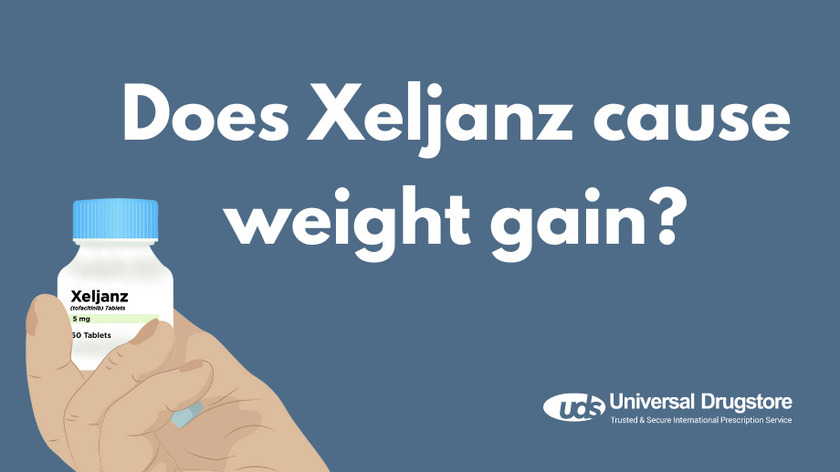Xeljanz is a medication used by adults to reduce joint pain and swelling in various types of arthritis including rheumatoid arthritis and one type associated with psoriasis. It is also approved by the U.S. Food and Drug Administration (FDA) to treat ulcerative colitis. While it is generally safe to use, it can cause some side effects. One side effect that was NOT seen in clinical trials was weight gain or weight loss. There could be many reasons that you would gain weight after starting Xeljanz. Keep reading and we will further discuss exactly what Xeljanz is and what might be the cause of weight gain while using it.
What does Xeljanz treat?
Xeljanz (tofacitinib) is a brand-name oral medication that is FDA-approved to treat adults with:
-
Active rheumatoid arthritis (RA)
-
Active psoriatic arthritis (PsA)
-
Ankylosing spondylitis
-
Active ulcerative colitis (UC)
Xeljanz is also approved to treat patients 2 years of age and older with polyarticular course juvenile idiopathic arthritis (pcJIA). Xeljanz is usually prescribed to patients who have failed one or more tumor necrosis factor or TNF blockers such as Humira (adalimumab). It can be used by itself or along with other arthritis medications such as Rheumatrex (methotrexate).
What does Xeljanz do to the body?
Tofacitinib is considered a JAK or Janus kinase inhibitor. JAK is a special protein (enzyme) that is found inside your cells that activates your immune system to cause inflammation and swelling. By blocking JAKs, Xeljanz reduces inflammation and helps relieve symptoms such as pain and swelling associated with certain types of arthritis and ulcerative colitis.
Why did I gain weight with Xeljanz?
Clinical studies used to gain FDA approval did not show any significant changes in body weight for those taking Xeljanz. There are various reasons you might gain weight after starting Xeljanz.
If you’re battling a chronic condition like RA that causes severe joint pain, you might find yourself gaining more weight because your physical activity and ability to exercise are limited. Also, Xeljanz may be taken with other medications such as methotrexate to treat RA. Methotrexate is a non-biologic disease-modifying antirheumatic drug (DMARD) that is known to cause gradual and modest weight gain. Maintaining a healthy weight is important if you are being treated for RA. Adults with RA who are overweight or obese often become disabled more quickly than people with RA who have a healthier weight.
While weight loss is a common symptom of ulcerative colitis (UC), it can sometimes cause a person to gain weight. Eating fruits, vegetables, and other typical healthier food groups can be impossible or dangerous for some people with UC. Exercising can also be hard for those with UC. While exercise has been proven to be beneficial, it can be difficult for those who are going to the bathroom a lot, are in pain, or are not sleeping. A combination of an unhealthy diet consisting of processed foods along with minimal exercise can lead to weight gain in people with UC.
What doses of Xeljanz are available?
Xeljanz is available in several dosage forms and strengths, including:
-
Xeljanz 5 mg and 10 mg immediate-release tablets
-
Xeljanz XR 11 mg and 22 mg extended-release tablets
-
Xeljanz 1 mg/mL oral solution
What other drugs should you avoid with Xeljanz?
When Xeljanz is taken with other medications, it can change how they work or make some side effects more likely or severe. You should ask your healthcare provider if any of the prescription medications, over-the-counter (OTC) drugs, vitamins, or supplements you take may interact with Xeljanz, including certain antifungals (ketoconazole and fluconazole) and certain DMARDs or potent immunosuppressants (cyclosporine, tacrolimus, and azathioprine).
What are the most common side effects of Xeljanz?
The most common possible side effects of Xeljanz are:
-
Upper respiratory tract infection
-
Urinary tract infection
-
Nausea
-
Diarrhea
-
Headache
-
Common cold symptoms
-
High cholesterol
-
Shingles (herpes zoster infection)
-
High blood pressure
Sometimes, Xeljanz can cause more serious side effects, including:
-
Serious, life-threatening allergic reactions (hives, shortness of breath, or swelling of your lips, tongue, or throat)
-
Increased risk of serious infections
-
Increased risk of death from cardiovascular events such as heart attack, stroke, and blood clots in people aged 50 years and older who have at least 1 heart-related risk factor and are taking Xeljanz twice a day
-
Increased risk of certain cancers including lymphoma, breast cancer, and skin cancer
-
Holes (perforations) in your stomach or intestines, especially if you take nonsteroidal anti-inflammatory drugs (ibuprofen), corticosteroids (prednisone), or methotrexate
-
Anemia (low red blood cells)
-
Liver problems and increased liver enzymes
Contact your healthcare professional for medical advice about any possible adverse effects you experience while taking Xeljanz. You can report your adverse effects to the FDA at 1-800-FDA-1088 or www.fda.gov/medwatch.
Xeljanz precautions
Before beginning Xeljanz, make sure your healthcare provider is aware of your medical conditions, including:
-
Active infection
-
Are a current or previous smoker
-
Personal or family history of cancer
-
Previous heart attack or stroke
-
History of blood clots
-
Hepatitis B
-
Kidney disease
-
Diverticulitis or ulcers in your stomach or intestines
-
A known allergy to tofacitinib or any ingredients in the Xeljanz formulation
-
Recently received or are scheduled to receive a live vaccine
-
Are pregnant, plan on becoming pregnant, or are breastfeeding
How long does it take Xeljanz to work?
How long it takes Xeljanz to begin working can depend on several factors, including the condition being treated. For adults being treated for rheumatoid arthritis and psoriatic arthritis, it may take as little as 2 weeks or up to 4 months before you experience less joint pain. For adults with ankylosing spondylitis, the majority of patients will see significant improvements within 4 months, while a small number may have success within 2 weeks. For adults with UC, most will see symptom improvements within 2 weeks, while it may only take a few days for some. The majority of pediatric patients being treated for juvenile idiopathic arthritis saw significant improvements within 18 weeks, while for some it only took up to 2 weeks.
Will Xeljanz cause hair loss?
Hair loss was not a side effect seen in clinical trials of Xeljanz. It has been used off-label to treat alopecia areata, an autoimmune disease that causes hair loss. Small studies have shown that people treated with Xeljanz saw significant hair growth.
What foods should I avoid with Xeljanz?
It is best to avoid grapefruit juice while taking Xeljanz as it may increase the levels of this medication and the risk of side effects.
Related Medications
-
Orencia (abatacept)
- Simponi (golimumab)
- Rituxan (rituximab)
Sources









